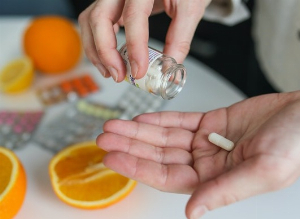Scientists breach brain barrier to treat sick patient
Published 12 Nov 2015

For the first time, doctors have breached the human brain's protective layer to deliver cancer-fighting drugs.
The Canadian team used tiny gas-filled bubbles, injected into the bloodstream of a patient, to punch temporary holes in the blood-brain barrier.
A beam of focused ultrasound waves applied to the skull made the bubbles vibrate and push their way through, along with chemotherapy drugs.
Six to 10 more patients will undergo the same procedure as part of a trial.
Experts said the experimental technique used at Sunnybrook Health Sciences Centre was exciting because it meant doctors might be able to give cancer patients potent drugs that otherwise would not work.
The same non-invasive method could also be used for other brain diseases, such as dementia and Parkinson's.
But many more safety studies are needed, they say. Animal trials have produced some results, but it is not yet clear whether the treatment would work or have side-effects.
Blood-brain barrier
The blood-brain barrier keeps pathogens and toxins away from the central nervous system. But this tightly packed layer of cells, which separates the brain from its blood vessels, can be a hindrance if you want to deliver drugs into the brain.
The Sunnybrook team temporarily ripped holes in the barrier to allow chemotherapy a safe passage through.
For eight years, Bonny Hall managed her brain tumour with medication - but earlier this year, she was told the cancer was growing.
Her tumour needed more aggressive, targeted therapy.
Her doctors asked the 56-year-old if she wanted to be the first in the world to try out a treatment that could deliver chemotherapy drugs via the blood-brain barrier.
She was given an intravenous infusion of chemotherapy followed by a small dose of the micro-bubbles that would punch a way through once they reached the target area of the brain and the ultrasound beam was switched on.
Brain scans suggest the treatment went to plan, and the researchers will soon examine a small part Ms Hall's tumour (removed surgically the day after the therapy) to confirm how much of the chemotherapy penetrated.
She says she is both nervous and excited "if I can help in any way".
"It's going to also look after things like epilepsy, Alzheimer's, a lot of other diseases," she says. "This isn't just about a brain tumour.
"I just want to be a normal mum, a normal grandma, just a normal housewife, a normal wife. That's all I really want to be."
All of the participants who will take part in the trial are among those already scheduled for traditional surgery to remove parts of their tumour.
Lead researcher and neurosurgeon Dr Todd Mainprize said: "The results are preliminary at this point because we don't have the levels of chemotherapy - but based on the gadolinium MRI scan, we were clearly able to open up the blood-brain barrier non-invasively, reversibly and it appears quite safely.
"We are always concerned about possible downsides to any treatment and this is why this phase-one trial is undergoing.
"We are looking at the safety profile."
Prof Gail ter Haar, an expert in ultrasound technology at the Institute of Cancer Research, London, said: "This is an exciting clinical step.
"Opening the blood-brain barrier using focused ultrasound beams has been a goal of researchers for about a decade, with the Toronto group being at its forefront, and it is exciting to see this reaching the clinic at last.
"The use of ultrasound for enhancing the local delivery of drugs to a number of different targets in the body is being investigated by a number of centres around the world, including the UK, and shows particular promise in the field of cancer chemotherapy."
Egle Solito, a senior lecturer at Barts and The London, Queen Mary's School of Medicine and Dentistry, said it was important not to raise hopes too soon.
"We need lots more research. The blood-brain barrier is a sealed system that protects the brain and when you open it, even temporarily, there are risks."
BBC

 Facebook
Facebook Twitter
Twitter


